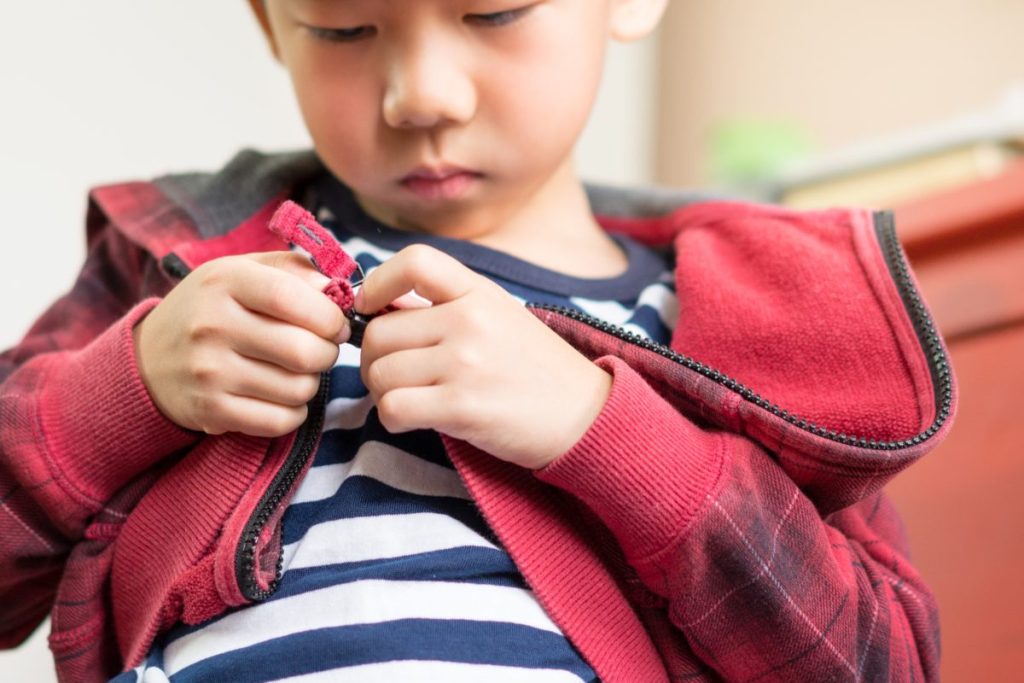
It’s common for babies to chew on anything and everything they get their hands on, especially when they’re teething. Putting any and all objects in their mouth is a normal part of development for babies, but by age 3, children usually outgrow this habit. However, if you’ve noticed your older child chewing on their shirt or other clothing items, it may cause some concern, especially since they should have outgrown the chewing phase.
If your 4-year-old (or older) is chewing on their shirt, there are many possible causes and motivations. It can be frustrating for parents who are dealing with constant soggy shirt collars, but fortunately, this is something that may be easily fixed at home, while some causes may require a call to the pediatrician. Let’s figure out what’s going on and why your child chooses to know how their clothing tastes.

Your child likes to fidget
Some kids chew on their shirts as a fidgeting behavior. They want some sensory input, and the shirt they’re wearing is simply the easiest and closest thing to play with. Children fidget to help them pay attention because they’re anxious, bored, or for other reasons similar to why adults sometimes fidget. Fidgeting could be a sign of ADHD or another condition, but it’s also common and not an immediate cause for concern.
A child may chew on their shirt out of boredom, either as a way to calm themselves or to help with a need for attention. Redirect the behavior by getting them a fidgeting toy to play with instead of their clothes. When you see them chewing, remind them to use their toy instead. “Chewelry” are wearable toys to be chewed on so that it’s always with them (just like their clothes).

See if you spot any patterns
Is there a pattern behind when the chewing happens? If you observe a pattern and figure it out on your own by noticing the time of day or feeling that always accompanies the chewing, you could solve the issue with a redirection or conversation.
Try these tips
- If it’s always right before snack time, it could indicate hunger and you could stop it by giving a snack earlier.
- If it’s always when they’re nervous or anxious, ask what’s wrong and try a breathing exercise.
- If they’re trying to concentrate on homework, offer a fidget toy.
- If it happens when they’re bored, give them an activity.
Stress is one of the most common causes of a child chewing on a shirt, so the behavior could be caused by a big change that’s worrying them, like starting a new school. If your child is chewing to self-soothe, you can work on finding another way to help them feel better about what’s concerning them.
It could also be purely out of habit at this point, like when kids default to nail biting. If you notice the pattern of chewing happens when they’re bored and they pick up their shirt collar or sleeve out of habit for something to do, try one of the redirection methods.

Talk about it with your child
Have a conversation with your child about clothes-chewing to help figure out the reason. They may simply tell you they like the chewing feeling, and give them something else to chew on, like gum. Their answers could also help you figure out if chewing on their clothing is a symptom of a specific condition.
Chewing could also mean
- A dental issue where the child is chewing on what is available as a means of pain relief
- Weak jaw muscles where the child is naturally trying to strengthen them
- Pica, a condition where people (especially children) eat non-food items
- Anxiety, autism, ADHD, or a sensory disorder
If your conversation brings up any of these, talk to your pediatrician about your concerns and how to proceed. If you can’t figure out the reason using any of the methods above, it’s also best to call the pediatrician for advice and perhaps screening for any of the possible conditions mentioned.

Is chewing a form of stimming?
As we’ve noted, chewing on a shirt, pencil, nails or any other object can help kids who are experiencing anxiety or sensory issues relax and calm down. According to Sensory Direct, “Stimming is something a child with autism does to help relieve anxieties by comforting himself.” Although stimming isn’t something only those on the spectrum do, chewing on clothing and other items is a common form of stimming in the autism community.
Occupational therapist Monica Patel told Very Well Family that while most chewing is harmless, “The most important distinction is to determine if sucking or chewing is hindering your child’s ability to participate in their daily routines or is posing a safety concern.”

What to avoid doing about it
As parents, when we notice a behavior (that we don’t love), we want to call it out to the child to get them to stop or to remind them to do something. We tell them to sit up straight, wash their hands, or pick up their toys. But with this particular habit, there are some things you should keep to yourself.
- You need to remain calm. You could make them more anxious if you keep on about it, which leads to more chewing.
- No yelling at your child about chewing. Don’t smack their hand or constantly tell them to stop it.
- Don’t punish them. They may not mean to do it or may not even realize they are doing it until it’s brought to their attention.
- Speaking of, don’t keep bringing it up that they do it. Keep redirecting the behavior to rewire their brain. Calling it out just makes them do it more.
As with any habit you want your child to break, patience and understanding are key. They are tiny humans trying to figure out why they feel a certain way and how to deal with it. They don’t need their safe adult adding to their worry. We all have a childhood habit we could think of that we wish was dealt with, with a little more grace.
In the end, chewing clothing could be a result of a diverse possibility of reasons that you’ll have to do some further detective work to figure out. It’s often about oral sensory input, which they could swap out with chewelry, crunchy veggies, or gum. If it’s an indication of anxiety or stress, you could work it out with them through a conversation and more resources if needed.
By observing and talking with your child, you’ll be on your way to determining which of the possible causes is the one behind your child’s chewing habit and how to get your little bunny rabbit to stop gnawing at their shirt.



